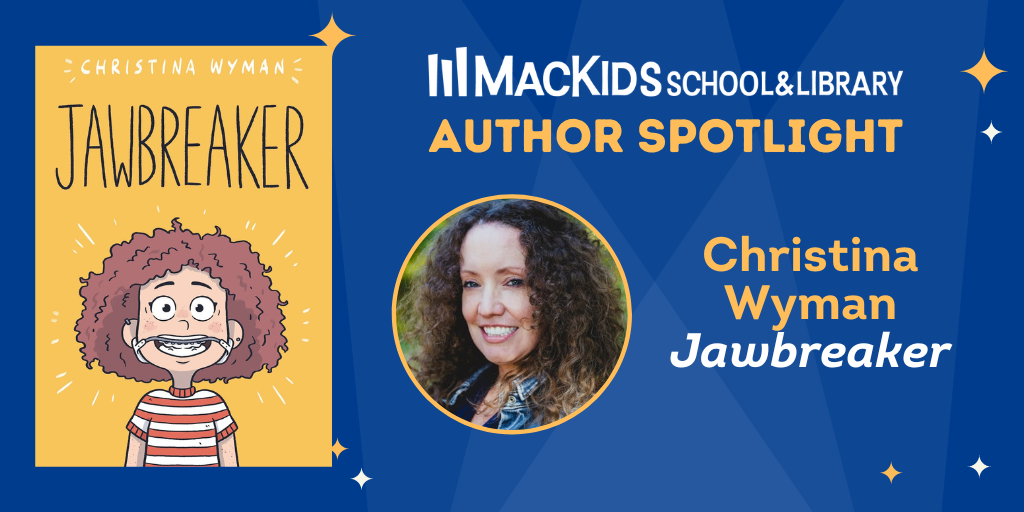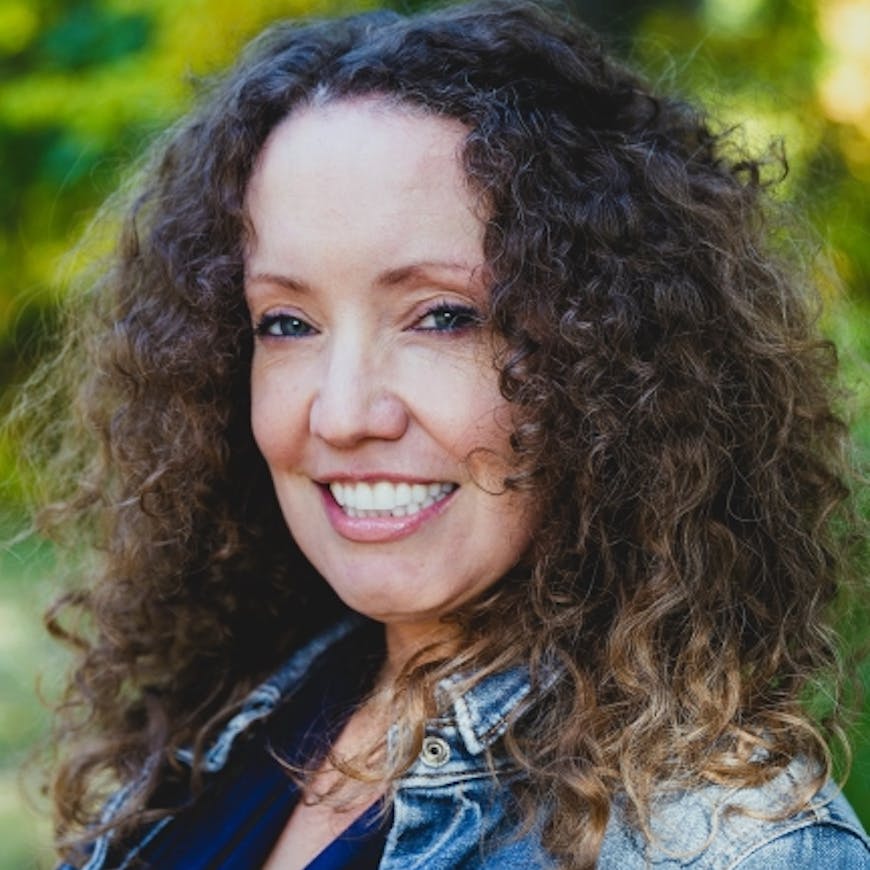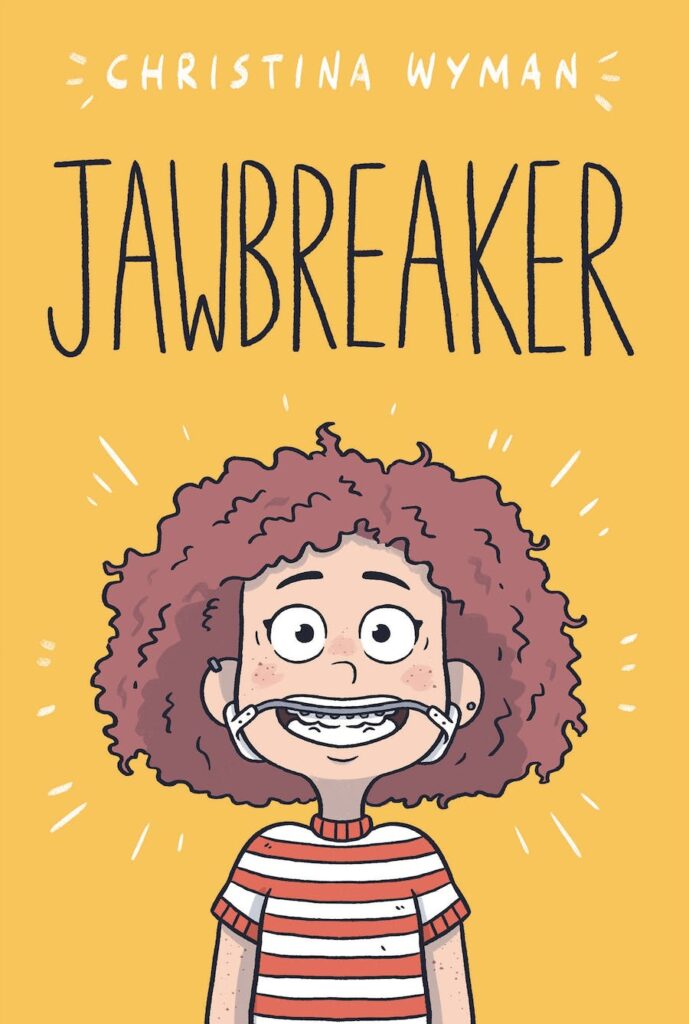
This month’s Author Spotlight highlights Christina Wyman, the author of Jawbreaker, a refreshingly honest middle-grade debut novel about toxic sibling rivalry, socioeconomic disparity, and dental drama.
JAWBREAKER is inspired by your life, but it’s not a memoir. In what ways is your protagonist, Max, like you, and in what ways is she different?
Max is like me in much the way that Max is like any adolescent, in that, the only thing in the world she wants is to belong. She wants to be loved and she wants to fit in. And I think she’s like the childhood version of me with her inclination to hide, or to use hiding as a means to protect herself. She’s also not great at standing up for herself, at least at first, which is something I can relate to on a profound level.
But Max is different from the adolescent version of me in that she’s much braver than I was at her age. She faces her fears in a very public way, and I admire that about her. What she winds up doing in the end is sadly not something I ever would have had the guts to do.
Why did you want to write a middle grade novel?
I think writing middle grade novels is my way of reckoning with a past that I still haven’t come to terms with. So it’s super therapeutic, but it’s also freeing, and I think it’s a way to rewrite some of my history in a gratifying and more satisfying way. Not all of my endings were happy, and I wanted Max to experience more happiness than I had at that age. Writing a middle grade novel with an “everything’s going to be okay” kind of ending helped me to reprocess some of what I’d experienced.
I also wanted to write for middle grade readers because of the way the category offers an opportunity to deal with some heavy-hitting issues (such as socioeconomic disparity, family toxicity, substance use disorders, bullying, and of course extreme dental drama) in a way that I didn’t have access to when I was growing up in the 80s and 90s. I wonder, sometimes, had I seen more of those experiences represented in the literature I read, whether I would have struggled so hard.
Do you have a favorite scene in the book?
I have several favorite scenes, but most of them are spoilers, so I probably shouldn’t give them away! Any scene where Max is (finally) sticking up for herself is a fave, but also scenes where she’s being held accountable for her own behavior and choices, because that’s important, too. There are a couple of funny scenes involving her dad that still make me laugh when I read through them. And, there is one scene that still makes me cry when I read through it – but I think this is all I should reveal for now!
What do you want readers to take away from JAWBREAKER?
I want readers to feel seen. Particularly readers from the kinds of socioeconomic backgrounds that don’t often get represented in children’s literature, and also readers from dysfunctional and toxic families that don’t typically get to see themselves reflected in literature. Like most authors for children, I want readers to feel seen and heard and to know that their trauma and their circumstances do not define them. I want readers to feel normal in a way that I never got to experience.
How do you hope JAWBREAKER will be used in classrooms and libraries?
It would be a dream come true to learn that a teacher or two, or a librarian or two, obtained copies of Jawbreaker because they view the book as containing meaningful opportunities for class discussion. I was a middle school teacher, and now I teach at the college level. I think many of my students across time (going on twenty years!) would say that my teaching is very “discussion based.” I am always dissecting books for themes and topics for their discussion, relational, or even their debate value. It would be an absolute joy to learn that Jawbreaker is being used in this way.
Tell us about a library, librarian or educator who made an impact on you as a child (or as an adult!).
I had several high school teachers who had a tremendous impact on me. They used literature to bring curriculum to life. One of them is named Mr. Brace – he was my English teacher at the high school I attended in Brooklyn, New York, and you might recognize his name as a really supportive presence for Max in Jawbreaker. Mr. Brace knew how to meet us – in all of our teenage glory – exactly where we were. Oh, and he was totally hilarious. He would unironically use teen slang in conversation with us, and we’d practically laugh ourselves to tears over it. He just really knew how to connect with us, while taking the content and curriculum super seriously. To me, that’s a stellar combination in a teacher and I’ll never forget him.
I should also say that, because I’m a teacher educator, my college students are generally aspiring teachers. This group of young people absolutely light up my world. They all inspire me, and they all impact me year in and year out. There’s a very special character in Jawbreaker who is named after an absolutely delightful former student of mine who has a love of journalism.
What was your favorite book when you were a young reader?
I really have too many favorite books to choose just one. I read everything I could get my hands on, and when nothing new showed up, I read them again. Because there are so many, I’m able to list most of them according to their author: Carolyn Keene (Nancy Drew Mysteries!) and Ann M. Martin (Baby Sitters Club series!) come to mind. I should also say that, because I did not come from a family of readers, I got away with reading a lot of Stephen King when I was twelve years old. My first Stephen King novel was IT. I still remember devouring the pages on the family couch, being unable to put it down, my parents none the wiser.
My literature selections really grew more expansive when I started teaching. The Poet X by Elizabeth Acevedo, is absolutely breathtaking – it was my first-ever engagement with a book-length story told through poems. Also, anything by Jason Reynolds is a homerun (I devoured GHOST in mere hours).
I also have memories of falling in love with a book called Mad, Mad, Monday, by Herma Silverstein. It’s about a teenager who falls in love with a teenage ghost from another era. I think it stands out to me because of how quirky – and just so cool – the concept was.
What advice would you give to young writers?
As difficult as some of our past experiences may be, they will serve you well one day – if you let them. You never know when you might develop an essay or a book (or poem, or song, etc.) out of something that, at the time, felt like an impossibly hard thing to go through. And don’t underestimate how helpful writing through your experiences can be. It’s true what they say about the therapeutic and redemptive value of turning pain into art.
Also, be wildly open to feedback but learn how to filter out the garbage. A few years before I wrote Jawbreaker, someone told me to stop writing for children, essentially because they didn’t think my stories were believable or relatable. (Spoiler: What they’d read at the time was a short story I’d written which was based on an earlier version of Max Plink, Jawbreaker’s main character.) One person’s opinion should not define whether you keep going, and you get to decide which opinions matter and which don’t. I can be really hard-headed, which is why I kept going.
On that note: Keep going.
About the Book
ABOUT THE AUTHOR:

Christina Wyman is a teacher and writer living in Michigan with her husband and silly rescue cat named Alfred—not to mention the raccoons, owls, and hummingbirds that occupy a tree outside their bedroom window. She grew up in a tiny apartment with her family in Brooklyn, New York, where she dreamed of becoming a writer. Her work has been published in New York Magazine, The Washington Post, Elle, Ms. Magazine, The Independent, and other outlets. Jawbreaker is her debut novel. When she’s not writing, you can find her stocking up on chocolate or trying to convince her husband to adopt more cats.
ABOUT THE BOOK:
Jawbreaker
On Sale October 24th!
Perfect for fans of Raina Telgemeier’s Smile, a refreshingly honest middle-grade debut novel about toxic sibling rivalry, socioeconomic disparity, and dental drama.
Max Plink’s life is complicated. Her parents aren’t getting along. The school bullies are relentless—and her own sister is the cruelest of them. Worst of all, her mouth is a mess. With a mismatched puzzle of a jaw, Max has a Class II malocclusion, otherwise known as a severe overbite. She already has braces, which means she lives on Advil and soft foods after each orthodontist appointment. But now Max has to wear painful (and totally awkward) orthodontic headgear nicknamed “the jawbreaker.” Could things get any worse?
Yes. The journalism competition Max wants to enter has a video component. But being on camera means showing her face not just to her junior high classmates, but possibly the whole city. Going viral is the last thing Max needs, but winning this competition is what she wants most. Turns out, following her dreams is complicated, too.
Inspired by Christina Wyman’s own experience with a Class II malocclusion, Jawbreaker is a humorous, heartfelt, and refreshingly relatable story.



